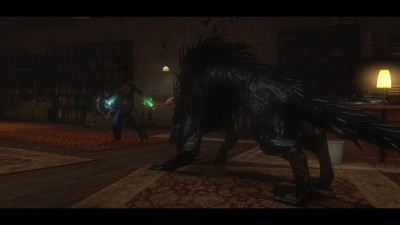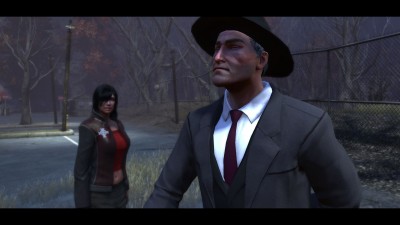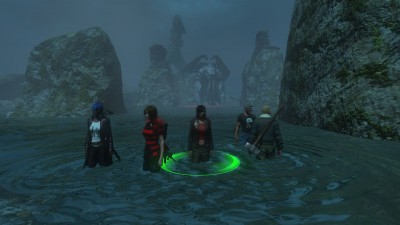He’s farting the tune to Don’t Stop Believin’
What did you DO, Ray?
Monthly Archives: July 2012
Intuition is the clear conception of the whole at once.
The Secret World is a deeply splendid game which brings with it some intriguing game-play elements, but it also remains a little bit buggy in places, as is the Funcom way. Certain quests are particularly susceptible to bugging-out, quite often when more than one player is trying to activate a step or solve a problem at the same time.
Investigation quests are one of the more interesting elements of the game, requiring players to use lateral thinking and powers of deduction to solve a chain of clues and riddles in order to resolve a mystery. Some of the answers to this particular type of quest are really quite obscure, and often require a significant leap of intuition on the part of the player.
But the really fun part comes when, after hours of increasingly more ludicrous attempts at solving the problem, with one’s character hanging upside down from a street lamp by one leg, with underpants on its head, candles in its ears, and its naked body covered in marmalade, one gives up in frustration and looks up the solution online, only to find that the quest is bugged and that the correct solution was, indeed, to simply put the key in the lock.
Sound trumpets! Let our bloody colours wave! And either victory, or else a grave.
There is a hard disk in my PC which is a graveyard for MMOs. An incredibly large and ponderous device, it is the ghostly oil tanker devoid of life, which drifts in an eternal bank of fog, whose hold is filled with an abandoned cargo of games past. The swift and nimble Zodiacs I use for the day-to-day traversing of the great gaming sea are both small and light, and thus carry only the bare MMO necessities—those few games which I currently play.
Upon entering the graveyard of MMOs, every folder is a beige pixel-hewn tombstone, every directory name prefaced in my mind by ‘Herein lies…’.
“Herein lies Lord of the Rings Online.
Long time friend.
Who got a bit boring and greedy
sometime near the end.”
I let my mouse cursor—virtual fingertip—wander across the surface of these hierarchical graves, tracing the memories captured in the names written there. Often I must resist exhuming a game, the swelling tide of happy remembrance threatening to breach the weakening resolve of my cynical defence against emotional floods. Usually I can content myself with browsing through old screenshots, as perfect as the day I took them – our picture albums no longer fade along with our memories.
Rarely do I attempt to resurrect a game from its magnetised mausoleum, but often I wish myself a Frankenstein of files, able to take a perfect piece from this crypt, some small segment from this other, and thence hammer and hew, stretch sinew and stitch, until my meisterwerk takes form. Would it be a monster? Would it be misunderstood? Could the best of what has come before be combined in a such a way that it still formed a whole, one which was greater even than the sum of these mighty parts? Perhaps Vanguard’s quiet lonely lumbering at the edge of MMO society has already answered this.
I dragged another vault to the graveyard of MMOs today: farewell Tera, I have fond memories of what you were, and sad thoughts of what you could have been. Now my Zodiac is loaded with The Secret World and Guild Wars 2, and as I push myself away from that leviathan of expired MMOs, before opening the outboard of my enthusiasm, I bask in the feeling that I won’t have need to return for quite some time.
It is the folly of too many to mistake the echo of a London coffee-house for the voice of the kingdom
Player characters in MMOGs don’t tend to be a very chatty bunch. Not the *players*; fascinating socio-political debates in /general, the growing prevalence of voice chat, you can’t shut those buggers up. Their characters, though, tend to let their actions speak for them, giving eloquent speeches like “KILL RAT KILL RAT KILL RAT KILL RAT KILL RAT KILL RAT KILL RAT KILL RAT KILL RAT KILL RAT”, with an occasional bit of interpretive dance (or as close as you can get with an /emote) chucked in. Even textual dialogue choices are mostly limited to “Yes, I would love to perform a menial task for meagre reward” or “I would love to perform a menial task for meagre reward, but have no room in my quest log at the moment.”
Recent games are featuring much chattier player characters; in Guild Wars 2 your character has fully voiced conversations, and of course there’s the Guinness World Record holding Star Wars: The Old Republic, but it’s a double-edged sword. On the one hand some players find it odd if ‘you’ are mute, especially when everyone else in the world is yakking away nineteen to the dozen, on the other hand if you don’t like the voice, or think it inappropriate for your character, it can be a real immersion-breaker.
In The Secret World Funcom have either ignored the issue entirely, or tackled it head-on, I’m not quite sure. There are many cutscenes as your character is recruited into a society, briefed on missions, given general information on what’s happening in the world, with extremely voluble NPCs, and throughout them all you say… nothing. Hardly unprecedented, but it’s a touch odd, especially given the amount of talking other people are doing. Sometimes, like when you’re recruited, it’s quite obvious the NPC is talking directly to you, other times it’s almost like they’re extemporising away and you just happen to be in the area… one scene seemed to be two other characters talking to each other while I stood somewhere in the vicinity (almost out of camera shot), but I still ended up being assigned a mission out of it. The game even lampshades your inaction, having NPCs offer a handshake, and commenting when you continue standing entirely immobile with no indication you’re even aware of their presence. Outside cutscenes you can quiz some NPCs about a range of subjects and receive a spoken response, with no in-game indication of how you managed to elicit it; my current theory is that you have a big pad of paper, and scrawl “YOURSELF” or “ZOMBIES” on it, then wave it at the NPC until they start talking.
It’s quite peculiar and has been mentioned in many of the posts and reviews of The Secret World that I’ve seen, but somehow it sort of works. Perhaps because the world in general in TSW is quite peculiar, in a good way. The whole business starts with an origin story inspired by Burl Ives (“I know an old Templar who swallowed a fly, I don’t know why she swallowed a fly, perhaps she’ll die? Or perhaps she’ll gain magical powers that enable healing through the medium of an assault rifle. It’s pretty much 50-50.”), and builds from there. I think a lot of the appeal of the game has been leaping head-first into the off-kilter version of our world without any prior knowledge, much like your character, and gradually piecing together what’s happening from talking to NPCs, examining lore items and other snippets you happen across, and in that context your character’s silence is an inspired Brechtian alienation device. Or maybe they just ran out of time and money for recording dialogue.
Look closely at those who patronize you. Half are unfeeling, half untaught.
Play the game, not the UI
Now, you might be thinking, “Hey, game designer! That’s about the stupidest thing ever typed.” And it kind of is. How else are you going to play the game? The way we mean it is: Since we are creating a living online world in which you heroically spend your time, we want you to viscerally experience that world.
Ben Miller, Game Designer, ArenaNet.
I know a certain set of MMO developers think that all players are dribbling innocents whose pretty little minds are preoccupied throughout the day by nothing but kittens and lollipops, but players have been talking about this for some time. No, really.
Respect the player
We respect you—as a player, as a human being.
“We think you’re clueless. But we respect you for it.”
It’s wonderful that you’re making a game for players, ArenaNet, truly. But could you stop making out that you’re single-handedly re-inventing the genre? When what you’re actually doing is implementing various features that players have been requesting (and subsequently been ignored over) for years.
Buttons
What we have are these ‘buttons’, and you can ‘press’ them to activate ‘abilities’. We want you to be able to intuitively control your character’s actions using the input device of your PC.
Okay, okay, I made that last one up.
Melmoth—resignedly awaiting the invention of the device which allows ArenaNet to patronisingly ruffle one’s hair over the Internet.
He steps on stage and draws the sword of rhetoric
With Bioware releasing the “Extended Cut” DLC, I’ve popped back to the single player campaign of Mass Effect 3 to see the new versions of the endings. Haven’t got terribly far yet, being distracted by The Secret World, but I thought I’d go back to a save game at the temple at Thessia to get a decent run up to the finish, and try and remember what was going on.
(This post is spoilery, in case you still haven’t played ME3 and are thinking you might want to at some point.)
I’d mercifully forgotten about perhaps my least favourite element of ME3. Never mind the ending(s), never mind schlepping around scanning the galaxy for random tat and playing “dodge the reaper”, what really wound me up was Kai “Sodding” Leng. A Cerberus assassin, he turns up and evades your clutches at the Citadel earlier in the game, stabbing one of your chums in the process, then just as you discover the secret of Thessia he crashes the party and spoils your day in a scripted encounter that you have no control over. That’s a little irritating in itself, but such is life in most games with cutscenes; you get captured, a key villain escapes your clutches, you just can’t save somebody, you pick a jacket that *really* doesn’t go with those trousers. Something happens in the story, regardless of what you do as a player. If Our Hero suffers setbacks along the way, it makes the eventual triumph sweeter, fine. Trouble is, so far as I can make out, Kai Leng is A Dude With A Sword. While battling horrors beyond imagination that are wiping out all life across the entire galaxy, you, Commander Shepard, Commander “Wipes Out A Couple Of Geth Fleets Before Breakfast” Shepard, Commander “Punched Out A Reaper” Shepard *and* your two elite highly trained companions are unable to stop one dude. Who doesn’t even have a gun. From a spot of Googling he seems to be in a couple of the tie-in novels, but from the perspective of the game he turns up with little fanfare. No massive build-up of what an awesome foe he is, not a returning nemesis from the first or second game, just A Dude With A Sword. Sure he’s above average when it comes to stabbing people with said sword, there’s a good chance he was voted “Most Likely To Stab Lots Of People With A Sword” in high school, but before that encounter you’ve been taking out gigantic truck-sized Brutes, twisted, mutated Banshees, big stompy Cerberus mechs with rocket launchers. If they wanted A Dude With A Sword (Oh All Right And A Few Psionic Powers) to be one of the toughest opponents in the game, he really needed a bit more build up. Or a much bigger sword.
I say “one of the toughest opponents”, he manages that by cheating; knock down his shields and he calls in backup in the form of a flyer that shines a bright light at you, proving Shepard really should’ve gone to Specsavers for free reactive lenses. Leng’s shields regenerate, and you get to do it all over again a couple more times; a fairly standard boss fight mechanic, but a little unusual in ME3. There’s a sort-of similar previous encounter when you’re using a target designator on a Reaper, but that’s a planet-destroying nightmare from space, not A Dude With A Sword. As boss fights go it’s not quite as jarring as the widely reviled encounters in Deus Ex: Human Revolutions, but it’s a bit of a faff. Though if you’re packing a massive sniper rifle and heavily geared for devastating headshots, three bullets interspersed with heavy sighs are enough to see him off.
Leng turns up once more, when you finally get to kill him off (or do you? Ahhh!) (Yes, you do.) (Or maybe you don’t?) (Except you really do.) (Don’t you?) I thought there might be some revelation; while Cerberus were monkeying around at the start of ME2 they used your DNA in a super-clone project (“Shepard… I am… your brother!” “NOOOOOOOOOO!”) Nope. Just a dude. With a sword.
So. Farewell then
Kai Leng.
You were a
Dude. With a sword.
Keith’s mum did not have
A sword, but apart from that
Would have been about
As plausible as a
Boss.
E. J. Shepard, 17½.
Tell me to what you pay attention and I will tell you who you are.
I wonder if Funcom should start a timer running when the end-user license agreement pops up on the patcher for The Secret World. I’d like to know the average time a player spends reading it.
I managed “End-user Agreement. PLEASE READ CAREF—” before the natural instincts of my index finger, honed over years of MMO quest accepting, and moving faster than the speed of thought, slammed itself knuckle-first from the top rope onto my mouse button while screaming “WHATEVER!”. I think that’s a new record of endurance for me.
The nice thing about accepting quests in The Secret World is that the nature of the game encourages you to stay a while and listen. Clues and hints, as well as atmospheric snippets of lore, are contained in the dialogue, and although the pertinent quest text is always included in the player’s journal, there are often still very useful titbits to be had by listening to the whole story from the NPC quest-giver. Not to mention the fact that the stories are simply compelling.
For me, the difference between The Secret World and Star Wars: The Old Republic is that the conversations in TSW seem bigger somehow. Most quests (outside of the main story) in SWTOR seemed no more than idle incidental background to excuse getting the player to kill ten womprats, whereas every quest dialogue in TSW seems to be part of a greater whole—part of a connected universe. Yes, even the ones getting you to go and kill ten zombrats. Ragnar Tørnquist has always been a great storyteller; whether you enjoyed The Longest Journey series as a game or not, it’s hard to deny that an epic tale is told within. I think a lot of Tørnquist’s talent shines through in the overarching story of TSW, which is revealed as much through the amalgamate of minor tales divulged with every quest, as it is through the main story quest; something which makes this small world feel more authentic than an entire galaxy of quests, far, far away.
The Secret World once again puts the lore in explore—one of the aspects of play which I’ve been missing in MMOs for quite some time.


